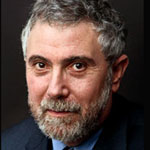 Paul Krugman is left of almost every Democrat, and he hates Wall Streeters. He’s Bernie’s kind of guy. Except for one thing. He’s smart. Really smart. And he knows health plans — from Medicare to Obamacare, from Hillary’s two plans to Bernie’s new plan. Here’s what he says.
Paul Krugman is left of almost every Democrat, and he hates Wall Streeters. He’s Bernie’s kind of guy. Except for one thing. He’s smart. Really smart. And he knows health plans — from Medicare to Obamacare, from Hillary’s two plans to Bernie’s new plan. Here’s what he says.
“For all the talk about being honest and upfront, even Sanders ended up delivering mostly smoke and mirrors.” As Krugman reminds us “I say this as someone who favors single-payer—but it’s just not going to happen anytime soon.” He finishes with: “And Sanders isn’t coming clean on that — he’s promising Medicaid-like costs while also promising no rationing. The reason, of course, is that being realistic either about the costs or about what the system would really be like would make it a political loser. But that’s the point: single-payer just isn’t a political possibility starting from here. It’s just a distraction from the real issues.”
As I said, this is really important. This the centerpiece of his campaign along with breakup up Big Banks. I’ll report what Krugman has to say about that soon, but first here’s Krugman’s full blog post on Bernie’s health-care “plan,” so you can read it all in context.
Health Reform is Hard
My column and Bernie Sanders’ plan crossed in the mail. But the Sanders plan in a way reinforces my point that calls for single-payer in America at this point are basically a distraction. Again, I say this as someone who favors single-payer — but it’s just not going to happen anytime soon.
Put it this way: for all the talk about being honest and upfront, even Sanders ended up delivering mostly smoke and mirrors — or as Ezra Klein says, puppies and rainbows. Despite imposing large middle-class taxes, his “gesture toward a future plan”, as Ezra puts it, relies on the assumption of huge cost savings. If you like, it involves a huge magic asterisk.
Now, it’s true that single-payer systems in other advanced countries are much cheaper than our health care system. And some of that could be replicated via lower administrative costs and the generally lower prices Medicare pays. But to get costs down to, say, Canadian levels, we’d need to do what they do: say no to patients, telling them that they can’t always have the treatment they want.
Saying no has two cost-saving effects: it saves money directly, and it also greatly enhances the government’s bargaining power, because it can say, for example, to drug producers that if they charge too much they won’t be in the formulary.
But it’s not something most Americans want to hear about; foreign single-payer systems are actually more like Medicaid than they are like Medicare.
And Sanders isn’t coming clean on that — he’s promising Medicaid-like costs while also promising no rationing. The reason, of course, is that being realistic either about the costs or about what the system would really be like would make it a political loser. But that’s the point: single-payer just isn’t a political possibility starting from here. It’s just a distraction from the real issues.

